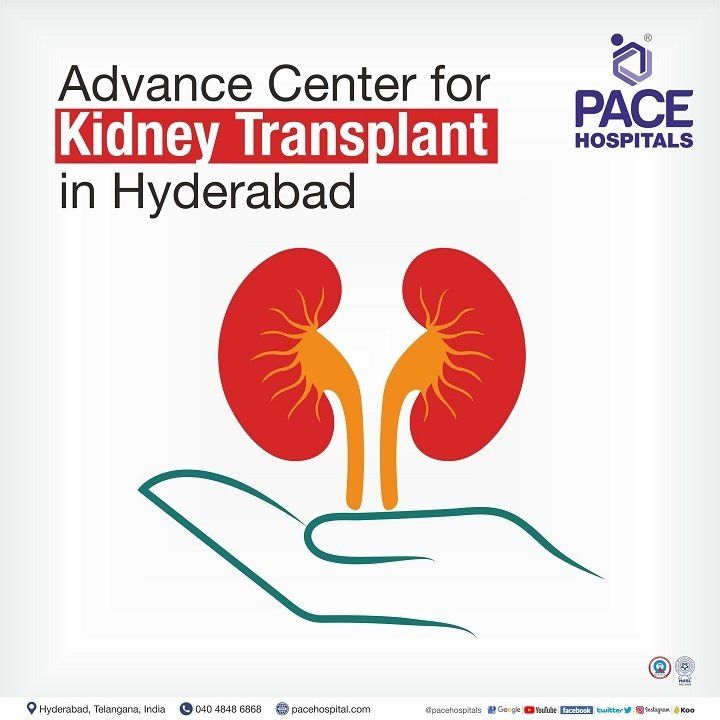Kidney Transplant in Hyderabad | Procedure, Cost & Success Rate
We have team of the best kidney transplant surgeons and transplant nephrologists. They are having extensive experience in performing Living donor kidney transplant and Deceased donor kidney transplant (Cadaveric kidney transplant) with the high success rate.
Request an appointment
Kidney Transplant Appointment Query
Thank you for contacting us. We will get back to you as soon as possible. Kindly save these contact details in your contacts to receive calls and messages:-
Appointment Desk: 04048486868
Whatsapp: 7842171717
Regards,
Pace Hospitals
Hitech City and Madinaguda
Hyderabad, Telangana, India.
Thank you for contacting us. We will get back to you as soon as possible. Kindly save these contact details in your contacts to receive calls and messages:-
Appointment Desk: 04048486868
Whatsapp: 7842171717
Regards,
Pace Hospitals
Hitech City and Madinaguda
Hyderabad, Telangana, India.
We are one of the Advanced Centre for Kidney Transplant in Hyderabad backed up with team of the best kidney transplant surgeons, kidney transplant doctors, transplant nephrologists (kidney specialist doctor), interventional cardiologist & pulmonologist, endocrinologist, vascular surgeon, infectious disease specialist doctor, psychiatrist, paramedical staff, dietitian and physiotherapist in India.
Kidney Transplant Team at Pace Hospitals, Hyderabad, India evaluates the donor and recipient thoroughly before performing the kidney transplantation by doing medical tests and radiological investigations including Blood testing, Urine testing, CT Scan or MRI Scan to ensure the fitness of the recipient and the donor. Living donor kidney transplant followed by an extensive and detailed evaluation of the donor first because safety of donor is very important before giving fitness clearance for transplantation.
Best Kidney Transplant Doctor in Hyderabad, Hitech city and Madinaguda
Dr. Vishwambhar Nath
40+ years of experience
MBBS, MS (General Surgery), DNB (Urology), M.Ch (Urology) (CMC Vellore, Tamil Nadu)
Senior Consultant Urologist & Renal Transplant Surgeon
Dr. A Kishore Kumar
11+ years of experience
MD (Medicine) (JIPMER), DM (Nephrology) (AIIMS, New Delhi)
Nephrologist & Kidney Transplant Physician
Department of Kidney Transplantation
Department of Kidney Transplant at Pace Hospitals, provides extensive and highly notable quality of living donor and deceased donor kidney transplant. The department is backed up with multidisciplinary team of kidney transplant and dedicated kidney transplant ICU (intensive care units) that help to accomplish complex and complicated surgeries with high success rates.
Our team of kidney transplant surgeons, transplant nephrologists and kidney specialist doctors are highly qualified in performing complex surgeries and organ transplants and, they are having extensive experience to perform the surgery with accuracy and precision. Transplant team is backed up with The World’s First Universal Surgical Robotic System, latest laser treatment equipment, state-of-the-art facility and modern technology offering comprehensive treatment.
PACE Hospitals is considered as one of the Best Kidney Transplant Hospital in Hyderabad, Telangana, India. Our department of Kidney Disease treated many patients with conditions and diseases related to kidneys such as Acute kidney failure, Glomerulonephritis,
Chronic Kidney Disease, Polycystic kidney disease (PKD),
Diabetic Kidney Disease, Amyloidosis (amyloid disease), Hemolytic uremic syndrome (HUS), Alport syndrome - inherited inflammation of the kidneys (nephritis), Nephropathic Cystinosis, Focal segmental glomerulosclerosis (FSGS), Fabry Disease, Goodpasture Syndrome (Anti-GBM Disease) etc.
What is Kidney Transplant Procedure?
Kidney transplant meaning
A kidney transplant procedure is a surgical method to replace a diseased kidney with a healthy kidney from a donor. A deceased organ donor's kidney or a living donor's kidney may be used. Immediate family members or others who are a good match for the kidney transplant may be able to give one of their kidneys. This type of transplant is also called a live transplant. Kidney donors can live a long and healthy life with just one healthy kidney.
The majority of the time, a single kidney is transplanted into a recipient. In extremely rare cases, two kidneys are transplanted. Kidneys from a deceased donor may be an option. The old kidney(s) usually not removed and will be placed in the abdomen. However, the old kidney will be removed out of the patient’s body under the following scenarios:
- Infection that may spread to the patient’s new transplanted kidney.
- Untreated or uncontrolled hypertension caused by old kidneys.
- Back up of urine into the kidneys (urinary reflux).
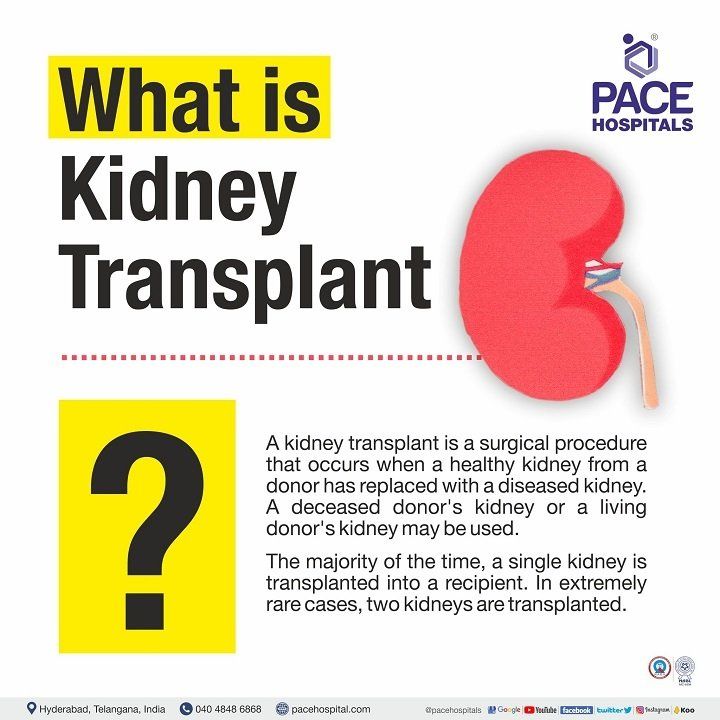
Indications for kidney transplantation
Kidney transplant is indicated for an end-stage renal disease (ESRD) patient, who might have kidney failure (< 15% of kidney function or glomerular filtration rate) as a life-threatening ailment. To remove the excess waste and fluids from the body, the patient needs to have dialysis on a regular schedule. A kidney transplant can aid them by providing a complete stoppage of dialysis.
The kidney transplant is necessary in order to restore the normal kidney functions, such as:
- Removal of urea and other liquid wastes from the body. Urea is produced when protein-rich foods like meat, poultry, and certain vegetables are digested in the body.
- Maintenance of salts, electrolytes, and other blood components in the blood.
- Synthesis of erythropoietin, a hormone that helps red blood cell development.
- Regulation of blood pressure, fluids and acid-base balance.
- A kidney transplant may also be required if the patient was born with kidney problems, such as congenital kidney abnormalities.
Causes of End-stage renal disease (ESRD)
The ESRD can be caused by the presence of a number of kidney diseases, such as:
- Diabetes and high blood pressure can induce kidney failure (1st and most important cause)
- Urinary tract infections (UTIs) that occur on a regular basis
- Other hereditary illnesses, such as polycystic kidney disease
- Glomerulonephritis, or inflammation of the filtering units of the kidney, is a condition in which the filtering units become inflamed
- Haemolytic uremic syndrome (HUS) is a rare kidney failure condition
- Immune system disorders such as lupus and others
Types of Kidney Transplant
The types of kidney transplant are based on the donor and their alive status. These are categorised into two types:
- Deceased-donor kidney transplant
- Living-donor kidney transplant
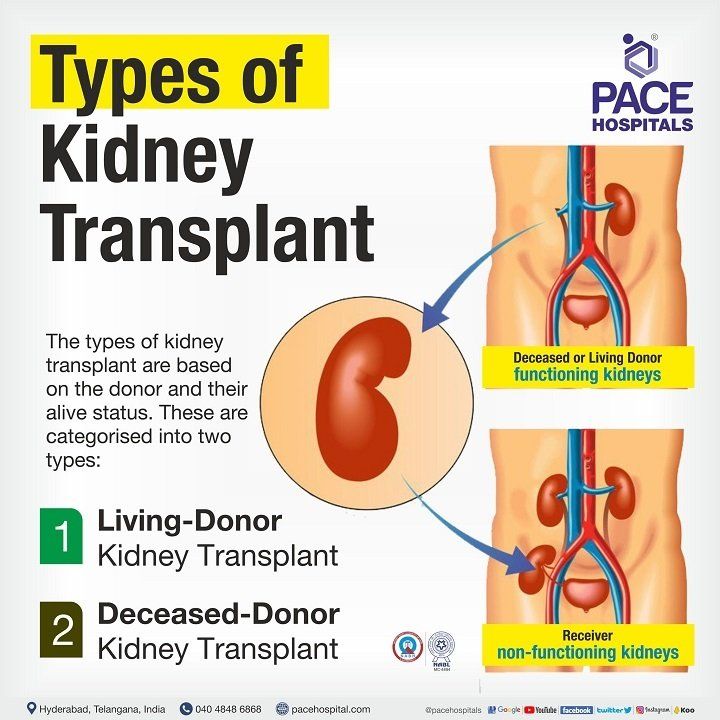
Deceased-donor kidney transplant or Cadaveric kidney transplant
A deceased donor (someone who died recently for reasons unrelated to the organ that will be transplanted) kidney transplant is described as the surgical transplantation of a kidney from a deceased donor whose native kidneys are not damaged and working correctly. Deceased donor organs are usually obtained from people who signed organ donor cards before death and wanted to donate their organs. The deceased person's relatives may also offer permission for donation of the deceased donor’s organ at the time of death.
Types of deceased donor kidneys
Deceased donor kidneys come in a variety of shapes and sizes. These terms are used to characterise the donor organs' anatomical, biochemical, and social characteristics. The patient will have the option of declining any or all of these organs. Based on the age of the deceased donors, they are classified into:
- Standard Criteria Donors (SCD)
- Expanded Criteria Donors (ECD)
- Donation after Cardiac Death (DCD)
- Donors with a History of High-Risk Social Behaviour
Standard Criteria Donors (SCD): These kidneys were donated by people less than 50 years who died of brain death due to a variety of conditions such as traumatic injuries or cerebrovascular stroke.
Expanded Criteria Donors (ECD): These kidneys are donated by donors over the age of 50- 60 with the presence of the following criteria:
- History of increased blood pressure
- Creatinine (renal biomarker) level greater than the normal laboratory value (1.5 mg/dL)
Donation after Cardiac Death (DCD): The donors who have suffered from severe and irreversible brain injury, but do not meet official brain death criteria are considered to be donors after cardiac death (DCD). The organs can be removed after the patient's heart has stopped beating.
Donors with a History of High-Risk Social Behaviour: These are people who have had a history of sexually transmitted diseases or drug use, or who have lived a solitary life at some point in their lives. At the time of organ recovery, each of these donors is checked for communicable diseases, and if found any high risk, it will be conveyed to patients or caretakers.
Living-donor kidney transplant
A living donor transplant is a surgery in which a healthy donor's kidney is surgically transplanted into a person with renal failure. A live donor is typically a member of the recipient's immediate family, such as a parent, sibling, or child; an uncle, aunt, or cousin; or even a spouse or friend. Strangers and good samaritans who desire to aid someone in need of a kidney can also provide living donor kidneys.
A living donor kidney transplant provides a number of benefits over a deceased donor kidney transplant, the most important of which is a far greater success rate. In addition to that, the following are the reasons.
- A kidney transplant from a living donor usually works right away. It may take several days or weeks for a deceased donor's kidney to resume normal function.
- A living donor transplant can be scheduled, giving both the recipient and the donor time to prepare. The availability of the deceased donor kidney will be questionable, but if it is available, surgery should be scheduled as soon as possible afterwards.
- In the case of an immediate kidney donor (blood relatives), the chances of transplant rejection are lower.
- The time taken to find a deceased donor kidney (which could take anywhere from three to five years) is generally longer than for a living donor kidney.
Kidney Transplant contraindications
The absolute contraindications or non-eligibility for the person donating (donor) the kidneys are as follows:
- Under the age of 18 and above 70 years
- Diagnosed with diabetes, active malignancy, albuminuria and psychiatric disorders
- Presence of human immunodeficiency virus (HIV)
- Obesity (BMI > 40 kg/m2)
- Glomerular filtration rate (GFR) less than 70 mL/min/1.72m2
- Hypertensive treatment, consisting of more than one medication
- Presence of horseshoe kidneys (formation of the horse-shaped kidney by infusion of two kidneys)
Absolute contraindications or ineligibility for recipients, if they are:
- Inability to tolerate surgery due to the presence of severe lung or heart disease
- Having active malignancy, active drug abuse and active infection
- Having uncontrolled psychiatric disease
Relative contraindications or ineligibility for recipients include:
- Patient with a history of dialysis and medication noncompliance
- Presence of psychiatric problems and frailty (condition of being delicate and weak)
- Patients with limited life expectancy (having less than the anticipated waiting time
Kidney transplant success rate in India
The kidney transplant procedure success rate in India is reported to be one of the highest in the world, with an estimated over 90% kidney transplant success rate for 7500 kidney transplantations per year. Presently, 90% of kidney transplants are obtained from living donors, and only 10% are from deceased donors (patients who died due to brain stroke or accidents).
Factors that might be associated with kidney success rate:
- Choice of a hospital: A well-established center equipped with advanced technology, good hygiene practices / policies and vastly experienced transplant nephrologists or kidney transplant surgeons should be a preferred choice.
- Kidney compatibility: Biological compatibility plays a vital role in the success rate of kidney transplants. It can be determined through a type of blood group, tissue types and crossmatching.
- Post-surgery complications: The presence of post-surgery complications such as infections are a higher risk of diminishing success rate.
- Age: Based on the type of donor, the kidney transplant success rate by age can be influenced. For instance, a 5-year survival rate for deceased-donor kidney transplant had reported 74.3% success in geriatrics (above 65 years) and nearly 96% in ages between 18 and 34 years when compared to 83.9% for living-donor kidney transplant in geriatrics and 97.8% in age between 18 and 34 years.
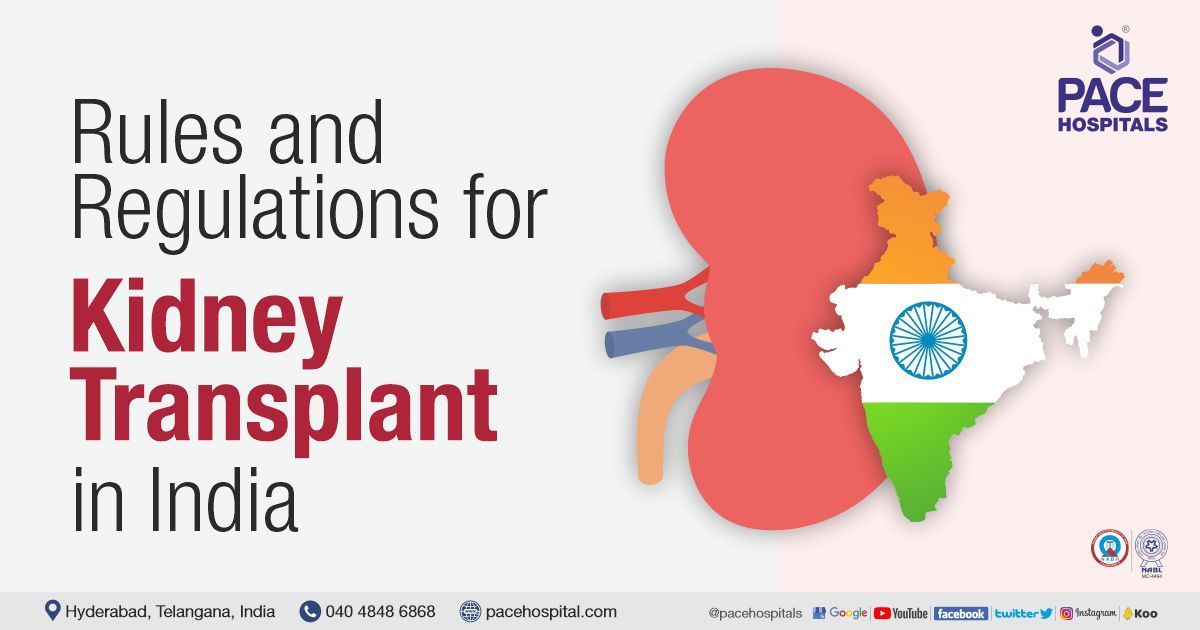
-
Is kidney transplant a major surgery?
Yes, a kidney transplant is a major surgery in which a person with renal insufficiency receives a healthy kidney from a donor, either alive or deceased. A kidney transplant that mimics the performance of a healthy kidney as nearly as possible is a good choice for a longer, healthier life in patients with end-stage renal disease.
-
Is kidney transplant painful?
The patient may experience pain after a kidney transplant surgery and varies person to person. Nerves are cleaved during the surgery that cause numbness around the surgery incision. The kidney transplant doctor may prescribe the medicines based on individual patient conditions.
-
Do you still need dialysis after a kidney transplant?
The necessity of dialysis depends on the kidney transplant's success rate. After a successful kidney transplant, the patient does not require more dialysis sessions because the transplanted or new kidney performs similarly to the average, healthy kidney. If the kidney transplant fails, the patient will be on dialysis until a second or subsequent kidney transplant session is performed.
-
How long does a kidney transplant surgery take?
Kidney transplant surgery is a major surgical procedure that takes approximately 4 to 6 hours. Because it involves two surgeries at one time – removing a damaged kidney from the recipient and replacing it with a donor's kidney at the same time.
Preparing for a kidney transplant surgery
Preparing for a kidney transplant mainly comprises finding a compatible partner.
A living or deceased kidney donor can be related or unrelated to the patient. When determining if a kidney donor will be a good match for the patient, the transplant team will take into account a number of variables. As a part of it, the following tests can be used to see if a donated kidney is compatible with the patient:
Blood typing: Blood typing is a method of determining the compatibility between the donor and recipient’s blood groups. This test detects blood antibodies that react to various blood types. Blood-type incompatible transplants are also possible, where they require additional medical therapy both before and after the procedure to limit the chance of organ rejection; these are known as ABO incompatible kidney transplantation.
Tissue typing: If the patient’s blood types are compatible, a tissue typing test known as human leukocyte antigen (HLA) typing will be performed. This test compares genetic markers that predict how long a donated kidney will last. The patient’s body is less likely to reject the organ if it is a good match.
Crossmatch: A small amount of the patient’s (recipient’s) blood is mixed to donor's blood in the lab for the third and final matching test. Antibodies in the patient’s blood are tested to see if they react to antigens in the blood of the donor. A negative crossmatch suggests they're compatible, and the patient’s body won't reject the donor kidney as easily. Positive crossmatch kidney transplants are also possible, but they necessitate additional medical care, both pre- and post-procedure, to limit the danger of the patient’s antibodies responding to the donor organ.
Matching age, kidney size, and infection exposure are some of the other characteristics the transplant team may evaluate while looking for the best donor kidney for the patient.
If the patient is on dialysis, the patient will have dialysis before the surgery. The patient needs to fast for 8 hours for a planned living kidney transplant. In case of a deceased transplant, the patient needs to fast from the time the kidney has become available.
Based on the patient's condition, the renal transplant surgeon might suggest any other suggestions.
What to expect during a kidney transplant surgery?
The renal surgeon will notify the patient when it is time to check into the hospital. The surgeon will describe the procedure to the patient, and the patient will be given an informed consent document to sign, authorising the kidney transplant surgeon to proceed with the kidney transplant surgery. Before signing, the patient should thoroughly read the consent document and clarify the queries is he or she has any with the renal transplant surgeon.
- The patient will be provided with a surgical gown to change the dress.
- The patient will be inserted with an intravenous line into the arm or hand, through which medications and sedatives will be administered.
- Throughout the surgery, the surgical team will keep an eye on the patient’s heart rate and blood pressure. The surgical site should be cleaned enough to be operated (removal of hair, if present excess).
Kidney transplant operation procedure:
- The patient will be inserted with a urinary catheter into their bladder.
- The patient will be placed on the operating table, lying on their back.
- The patient will be placed a tube directly into their lungs via the oral route (mouth), through which the patient will be provided with artificial breathing through the use of a ventilator to which the inserted tube will be connected.
- An antiseptic solution will be used to clean the skin above the surgery site.
- The surgeon makes an incision at the lower part of one side of the patient’s abdomen and places the new kidney into the body. Before implanting, the renal surgeon will visually inspect the donor's kidney.
- When the donor's kidney is ready, it will be implanted abdominally. The patient will get a new kidney from a donor, where the left donor’s kidney will be placed on the right side and the right donor’s kidney on the left side of the patient. The ureter's link to the bladder can thus be quickly and easily accessed.
- The donor’s (new kidney’s) renal artery and renal vein will be sutured to the recipient's (patient’s) external iliac artery and vein, respectively.
- The blood flow through the blood vessels (arteries and veins) will be examined for signs of bleeding at the suture lines after the arteries and veins have been joined.
- A donor ureter that is a tube that connects the kidney to the bladder will be implanted.
- Stitches or surgical staples will be used in order to close the incision. Swelling at the incision site can be reduced by inserting a drain. A clean bandage or dressing will be applied at the site of the surgery.
What to expect after a kidney transplant surgery?
After kidney transplant procedure steps:
- The patient will be shifted to the recovery room for kidney transplant post surgery care. The patient may be moved to the ICU (intensive care unit) for close monitoring once the patient's blood pressure, pulse, and respiration have stabilised. As the patient recovers, they will be moving out of ICU to the general room.
- A kidney transplant from a living donor may begin producing urine right away. A cadaver kidney's urine output may take longer. It's possible that the patient may keep on dialysis until the urine output returns to normal.
- The patient will be placed with a catheter in the bladder to remove the urine. The drained volume aid in measuring the new kidney function.
- The patient will be on intravenous fluids until the patient can take in enough liquids and food on their own.
- The renal surgeon team will keep a close eye on how anti-rejection medicines are working on the patient to make sure that the patient is taking appropriate medication.
- Regular blood samples will be taken to monitor the new kidney's health and other organs and systems, such as the liver, lungs, and blood system.
- The patient will slowly move to solid foods, and they will be on limited fluids in order to prevent overpressure.
- The patients should be able to move around the next day after the treatment. Several times a day, the patients should get out of bed and move around.
- As directed by the healthcare professional, the patient should take pain medication for soreness.
- The patient needs to avoid using aspirin or other pain relievers that may raise the risk of bleeding.
- At the time of discharge, the patient will be provided with counselling related to care for the incision, the food and the medication.
Complications of kidney transplant procedure
Significant complications can arise during kidney transplant surgery, and they can include:
- Bleeding and clotting in blood vessels
- Blockage of the ureter tube that connects the kidney and bladder
- A donated kidney fails or is rejected
- A contagious disease that could be spread by organ donation, such as cancer or illness
- Cardiovascular disease, cerebrovascular accident and death
- Infection to the surgical site
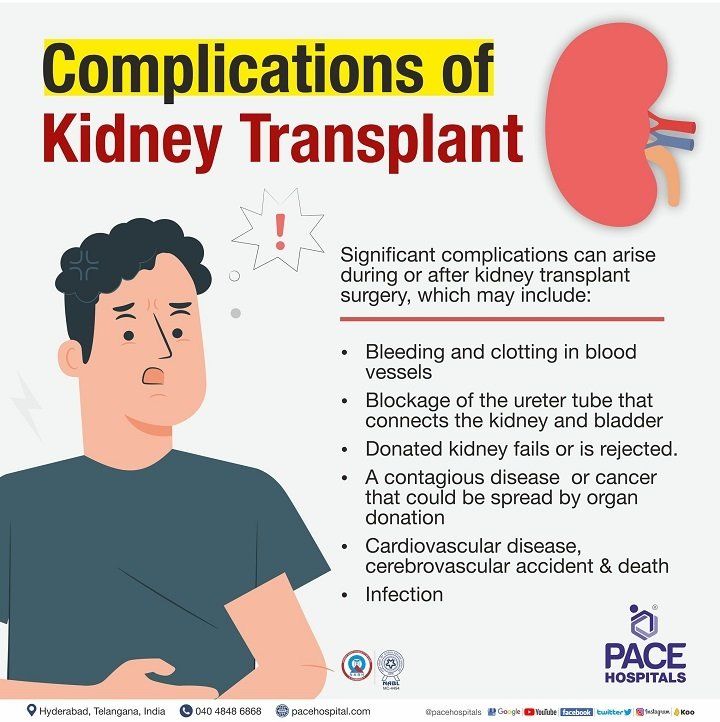
Anti-rejection medication side effects
Significant complications can arise during kidney transplant surgery, and they can include:
- Bleeding and clotting in blood vessels
- Blockage of the ureter tube that connects the kidney and bladder
- A donated kidney fails or is rejected
- A contagious disease that could be spread by organ donation, such as cancer or illness
- Cardiovascular disease, cerebrovascular accident and death
- Infection to the surgical site
Post-kidney transplant patient questions
- Will my old kidney, which is left over inside will, cause any problems?
- Is my kidney replaced successfully?
- When can I go for my normal routine work?
- How much liquid should I consume?
- Should I be on dialysis after this?
- When to resume my old medication, which was stopped prior to the surgery?
- When will my stitches be removed?
- At the time of discharge: When to come back for a follow-up?
Kidney Transplant Patient Testimonial
Bangladesh Patient, age 32-year-old with chronic kidney disease (CKD) was successfully treated with kidney transplantation and with subsequent urine examination the patient shown improvement without the presence of any proteinuria, hematuria, fever and graft tenderness.
Frequently asked questions:
Who can get a kidney transplantation?
Kidney transplants are available for individuals of various ages, from children to seniors.
- To get the procedure, the patient must be in good health. In addition, the patient must be cancer and infection free.
- To ensure that a person is a good candidate for transplant, they will undergo a thorough medical and psychosocial evaluation. The evaluation aids in the detection of any issues that can be addressed prior to transplantation. Transplantation is an excellent therapy option for the majority of people.
Who cannot get a kidney transplant?
Many patients believe they are too old for a transplant; however, age is not a consideration in transplant eligibility if the patient is otherwise healthy. Other problems, however, may preclude individuals from receiving a kidney transplant, such as:
- Life expectancy is currently less than five years.
- Cancer that has recently occurred (other than most skin cancers)
- Heart illness that is incurable
- Psychiatric disorder that is incurable
- Dialysis appointments are missed, or the machine is turned off early.
- Substance abuse that is ongoing (alcohol or drugs)
When should I get a kidney transplant?
The earlier the patient receive a kidney transplant, the better is the survival. The nephrologists and the kidney transplant team will select the ideal time for the patient to have a transplant.
How long does a kidney transplant last?
The success rate of kidney transplants is very high, at around 95%. The typical lifespan of a transplant from a living donor is 15-20 years, but a transplant from a deceased donor is just 10-15 years. In the event of a failed transplant, the patient may begin or resume dialysis treatment and / or look for a second organ donor.
When can I return to work?
The duration of time it takes the patient to return to work is determined by the patient recuperation, the type of work the patient does, and any other medical issues the patient may have. After their transplant, many people are able to return to work after eight weeks or more. The transplant team will assist the patient in determining when the patient is ready to resume work.
What are the advantages of a kidney transplant over dialysis?
While dialysis is a life-saving procedure, it only performs roughly 10% of the functions that a healthy kidney does. Dialysis might induce various health concerns as a result of its effects on the body. The maximum life span after a kidney transplant is estimated to be an average of 10 - 15 years more than that of those who remain on dialysis (Hemodialysis or
Peritoneal Dialysis (PD)). In addition, the majority of people claim that transplantation improves their quality of life significantly.
What happens to the old kidneys after the transplant?
The diseased kidneys are not removed in the vast majority of instances. The damaged kidneys may need to be removed for one of the following three reasons:
- Pain or infection that might be spreading to the transplanted kidney
- If the natural kidneys are causing uncontrollable hypertension
- Urine backup in the kidneys (a condition called reflux)
How many kidney transplants can a person have?
The patient can have more than one transplant; it depends on their age and the number of times their body has been through the process. Two, three, or even four kidney transplants can be performed on a patient during their lifetime. The renal surgeon will make the call by analysing the risk-to-reward ratio based on the patient’s condition.
Which are the Top 10 Kidney Transplant Hospitals in Hyderabad, India?
PACE Hospitals is among the Top 10 Kidney Transplant Hospitals in Hyderabad, India, catering Living donor kidney transplant and Deceased donor kidney transplant (Cadaveric kidney transplant) with a high success rate and 24x7 hassle-free comprehensive pre- and post-transplant support.
How long can a person with a kidney transplant live?
In general, patients who have had successful kidney transplants can see an improvement in their quality of life. The duration of survival is determined by the type of donor kidney used in the transplant. A kidney from a living donor will typically function for 12-20 years, whereas a kidney from a deceased donor would only function for 8-12 years.
How to get a donor for kidney transplant in Hyderabad, Telangana?
Organ recipient can get the kidney from a living donor in immediate family members. In case there is no living donor, person awaiting a transplant need to register at donor waiting list on AACT, Jeevandan for cadaver donor through an Organ Transplant Centre (OTC) in Hyderabad, Telangana.
Jeevandan is a comprehensive cadaver organ transplantation scheme initiated by The Government of Telangana, proposed by the Cadaver Transplantation Advisory Committee (CTAC) to give a fillip to organ transplantation. Organ recipient registration will be done in two categories.
- Super urgent transplantation
- Elective transplantation
Jeevandan Cadaver Transplanatation Programme, Telangana priorities the list of cadaver donors. First priority shall be given to an Organ Transplant Centre (OTC) where the deceased donor is located. If, for any reason, the OTC is not able to accept the organ, the organ will be passed on to the general pool.
Super urgent transplantation registration is prioritized over elective list and general pool.
Which is the best kidney transplant hospital in Hyderabad, India?
PACE Hospitals is the one of the best kidney transplant hospitals in Hyderabad, India, backed up by a multidisciplinary adult and pediatric kidney transplant team and dedicated kidney transplant ICU (intensive care units) and equipped with CRRT, World’s First Universal Surgical Robotic System, the latest laser treatment equipment, state-of-the-art facility and modern technology.
How much does kidney transplant cost in India?
The average cost of a Kidney Transplant in India is approximately Rs. 8,75,000 (eight lakh seventy-five thousand). However, Kidney Transplant price in India ranges vary from Rs. 6,20,000 to Rs. 12,75,000 (six lakh twenty thousand to twelve lakh seventy-five thousand) and depends upon multiple factors and differs from case to case. However, cost may vary depending upon the different hospitals in different cities.
What is the cost of kidney transplant in Hyderabad?
Kidney Transplant cost in Hyderabad ranges vary from Rs. 6,50,000 to Rs. 9,00,000 (six lakh fifty thousand to nine lakh). However, price or cost of kidney transplant in Hyderabad depends upon the multiple factors such as age, patient condition, blood group matching, associated conditions, room selection in hospital and, CGHS, ESI, EHS, TPA-insurance or corporate approvals for cashless facility.
Our Locations
Subscribe to our newsletter and stay updated with the latest health information.
By clicking on subscribe now, you accept to receive communications from PACE Hospitals on email, SMS and Whatsapp.
Subscribe to PACE Hospitals News
Thank you for subscribing. Stay updated with the latest health information.
Oops, there was an error. Please try again submitting your details.
-

Payment in advance for treatment (Pay in Indian Rupees)
For Bank Transfer:-
Bank Name: HDFC
Company Name: Pace Hospitals
A/c No.50200028705218
IFSC Code: HDFC0000545
Bank Name: STATE BANK OF INDIA
Company Name: Pace Hospitals
A/c No.62206858997
IFSC Code: SBIN0020299
Scan QR Code by Any Payment App (GPay, Paytm, Phonepe, BHIM, Bank Apps, Amazon, Airtel, Truecaller, Idea, Whatsapp etc)
Call us at 04048486868
ADDRESS
PACE Hospitals
Hitech City : Beside Avasa Hotel, Pillar No. 18, Hyderabad - 500081
Madinaguda: Mythri Nagar, Beside South India Shopping, Madinaguda, Hyderabad - 500050
QUICK LINKS
Disclaimer
General information on healthcare issues is made available by PACE Hospitals through this website (www.pacehospital.com), as well as its other websites and branded social media pages. The text, videos, illustrations, photographs, quoted information, and other materials found on these websites (here by collectively referred to as "Content") are offered for informational purposes only and is neither exhaustive nor complete. Prior to forming a decision in regard to your health, consult your doctor or any another healthcare professional. PACE Hospitals does not have an obligation to update or modify the "Content" or to explain or resolve any inconsistencies therein.
The "Content" from the website of PACE Hospitals or from its branded social media pages might include any adult explicit "Content" which is deemed exclusively medical or health-related and not otherwise. Publishing material or making references to specific sources, such as to any particular therapies, goods, drugs, practises, doctors, nurses, other healthcare professionals, diagnoses or procedures is done purely for informational purposes and does not reflect any endorsement by PACE Hospitals as such.

